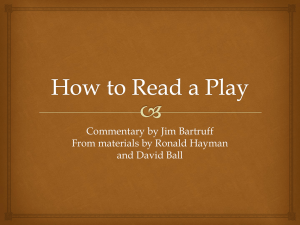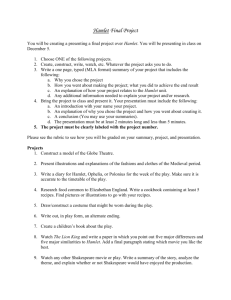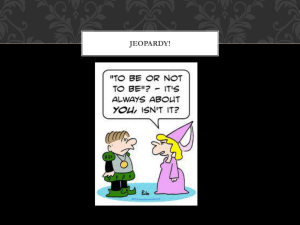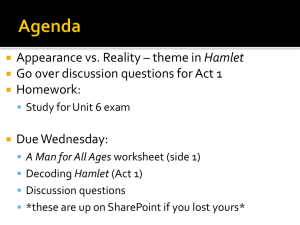Handout 1
advertisement
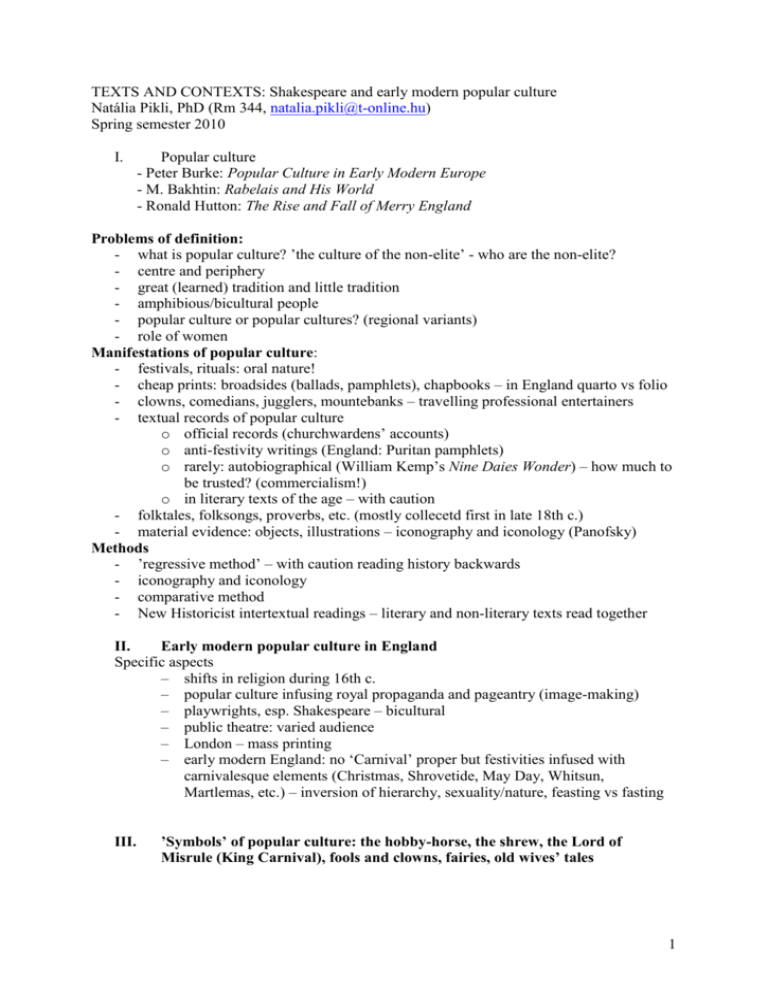
TEXTS AND CONTEXTS: Shakespeare and early modern popular culture Natália Pikli, PhD (Rm 344, natalia.pikli@t-online.hu) Spring semester 2010 I. Popular culture - Peter Burke: Popular Culture in Early Modern Europe - M. Bakhtin: Rabelais and His World - Ronald Hutton: The Rise and Fall of Merry England Problems of definition: - what is popular culture? ’the culture of the non-elite’ - who are the non-elite? - centre and periphery - great (learned) tradition and little tradition - amphibious/bicultural people - popular culture or popular cultures? (regional variants) - role of women Manifestations of popular culture: - festivals, rituals: oral nature! - cheap prints: broadsides (ballads, pamphlets), chapbooks – in England quarto vs folio - clowns, comedians, jugglers, mountebanks – travelling professional entertainers - textual records of popular culture o official records (churchwardens’ accounts) o anti-festivity writings (England: Puritan pamphlets) o rarely: autobiographical (William Kemp’s Nine Daies Wonder) – how much to be trusted? (commercialism!) o in literary texts of the age – with caution - folktales, folksongs, proverbs, etc. (mostly collecetd first in late 18th c.) - material evidence: objects, illustrations – iconography and iconology (Panofsky) Methods - ’regressive method’ – with caution reading history backwards - iconography and iconology - comparative method - New Historicist intertextual readings – literary and non-literary texts read together II. Early modern popular culture in England Specific aspects – shifts in religion during 16th c. – popular culture infusing royal propaganda and pageantry (image-making) – playwrights, esp. Shakespeare – bicultural – public theatre: varied audience – London – mass printing – early modern England: no ‘Carnival’ proper but festivities infused with carnivalesque elements (Christmas, Shrovetide, May Day, Whitsun, Martlemas, etc.) – inversion of hierarchy, sexuality/nature, feasting vs fasting III. ’Symbols’ of popular culture: the hobby-horse, the shrew, the Lord of Misrule (King Carnival), fools and clowns, fairies, old wives’ tales 1 HAMLET Lady, shall I lie in your lap? Lying down at OPHELIA's feet OPHELIA No, my lord. HAMLET I mean, my head upon your lap? OPHELIA Ay, my lord. HAMLET Do you think I meant country matters? OPHELIA I think nothing, my lord. HAMLET That's a fair thought to lie between maids' legs. OPHELIA What is, my lord? HAMLET Nothing. OPHELIA You are merry, my lord. HAMLET Who, I? OPHELIA Ay, my lord. HAMLET O God, your only jig-maker. What should a man do but be merry? for, look you, how cheerfully my mother looks, and my father died within these two hours. OPHELIA Nay, 'tis twice two months, my lord. HAMLET So long? Nay then, let the devil wear black, for I'll have a suit of sables. O heavens! die two months ago, and not forgotten yet? Then there's hope a great man's memory may outlive his life half a year: but, by'r lady, he must build churches, then; or else shall he suffer not thinking on, with the hobby-horse, whose epitaph is 'For, O, for, O, the hobby-horse is forgot.' (Hamlet, III.2.) ”a figure of a horse, made of wickerwork, or other light material, furnished with a deep housing, and fastened about the waist of one of the performers, who executed various antics in imitation of the movements of a skittish and spirited horse” (OED) • Churcwarden Accounts (1557), Nottingham city records (1569) payments ”to Mynstrels and the Hobby-horse on May Day” and ”to them that did play with ye hoby horse” 2 • plays • cony-catching pamphlets • Stubbes, Anatomie of Abuses, 1583 : Thus al things set in order, then haue they their Hobby- horses, dragons & other Antiques, togither with their baudie Pipers and thundering; Drummers to strike vp the deuils daunce withal […] marche these heathen company towards the Church-yard, their pipers pipeing, their drummers thundring, […]dancing, […], their handkerchiefs swinging about their heds like madmen, their hobbie horses and other monsters Then, after this, about the Church they goe into the church-yard, where they haue commonly their […] banqueting houses set vp, wherin they feast, banquet & daunce al that day & (peraduenture) all the night too. And thus these […]furies spend the Sabaoth day. Cobbes prophecies, his Signes and Tokens, 1614 But when the Hobby-horse did wihy, oh pretty wihy, Then all the Wenches gaue a tihy, oh pretty tihy. • sexuality: ’to ride a woman’ - also the ’illicit sexuality’ – ’to take a hobby-horse turne or two’ meant illicit sexual activity (M.E. Lamb) • a simultaneous anxiety over and curiosity regarding the ’monstrous man-beast’ in the late 16th century: tourney-style hobby-horse, where man and beast are both visible more prominent in the late 16th century than the earlier full masks (tourney+headmask), like eg. the Norwich dragon ’Old Snap’ (1451) or the Salisbury ’Hob-Nob’ with their snapping jaws • ’ For O for O the hobby-horse is forgot’: proverbial from a lost old ballad – the Ofactor turned textual and also semi-textual on stage (gestures, innuendo – tone of voice) • how oral culture turns proverbial then textual (also in TShrew, III.2. Biondello’s rhymes: ’probably the fragment of a lost ballad’ – reference to hobby-horse?) BIONDELLO: Nay, by Saint Jamy, I hold you a penny, A horse and a man Is more than one, And yet not many. (The Taming of the Shrew III.2.) OTHER MEANINGS: • 1632, Sherwood, French-English Dictionary: ”A (childs) hobbie-horse, bastob, ou cheval du bois d’un enfant” • 1589, Puttenham: The Arte of English Poesie BOTH the usual dismissal of it as a children’s pastime not fit for grown-up men and object of nostalgia: 3 No more would it be seemely for an aged man to play the wanton like a child, for it stands not with the conueniency of nature, yet when king Agesilaus hauing a great sort of little children, was one day disposed to solace himself among them in a gallery where they plaied, and tooke a little hobby horse of wood and bestrid it to keepe them in play, one of his friends seemed to mislike his lightnes, ô good friend quoth Agesilaus, rebuke me not for this fault till thou haue children of thine owne, shewing in deede that it came not of vanitie but of a fatherly affection, ioying in the sport and company of his little children, in which respect and as that place and time serued, it was dispenceable in him & not indecent. • The hobby-horse/plaything used as satire: Peacham’s Minerva Britanna, 1612 1. Hobby-horse – Fool BENEDICK I have studied eight or nine wise words to speak with you, which these hobbyhorses must not hear. (Much Ado About Nothing 3.2. 64-66) Possible reasons for overlapping: both Fool & Hobby-horse directly addressing the audience, sexual innuendo (the Betley window, early 16th c.) 2. Hobby-horse – ‘wanton women/prostitute’ ARMADO: But O – But O – MOTH: ’The hobby-horse is forgot’ ARMADO: Call’st thou my love a ’hobby-horse’? MOTH: No, master. The hobby-horse is but a colt, and your love perhaps a hackney. (LLL 3.1.26-30.) BIANCA [speaking to Cassio about the handkerchief]: This is some minx’s token, and I must take out the work; there, give it the hobby-horse, wheresoever you had it, I’ll take out no work on’t. (Othello 4.1.151.153) LEONTES: My wife’s a hobby-horse; deserves a name As rank as any flax-wench that puts to Before her troth-plight. (WT I.2. 276-278) • 1598, Florio Vbino ”a hobbie horse such as Ireland breedeth” • conduct books: good household management – tamed horses and wives • Ballad: Here Begynneth a Merry Jest of a Shrewd and Curste Wyfe, Lapped in Morelles Skin, for Her Good Behavyor (printed by Hugh Jackson, 1550) • Humiliating practices: Skimmington ride, carting, scold’s bridle 4




